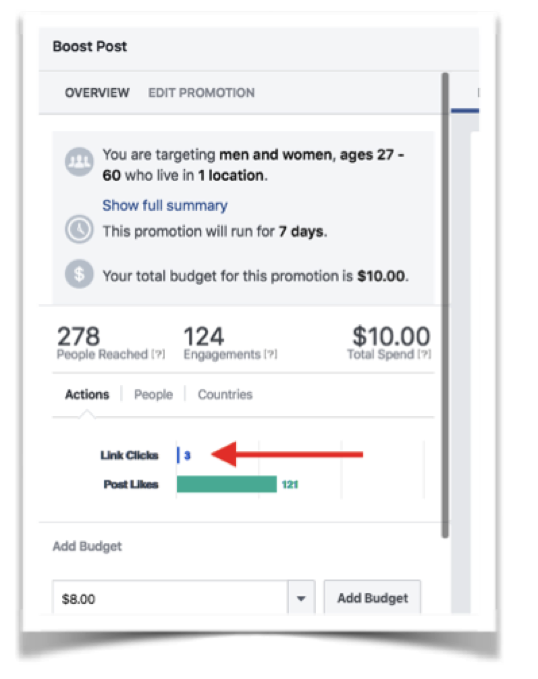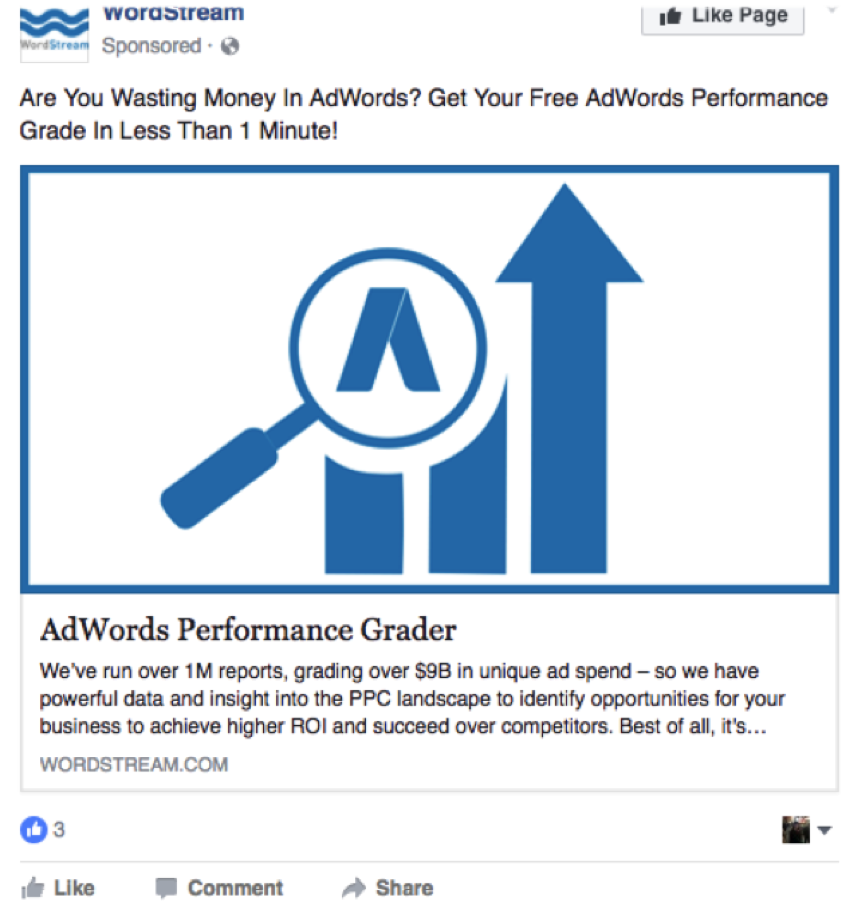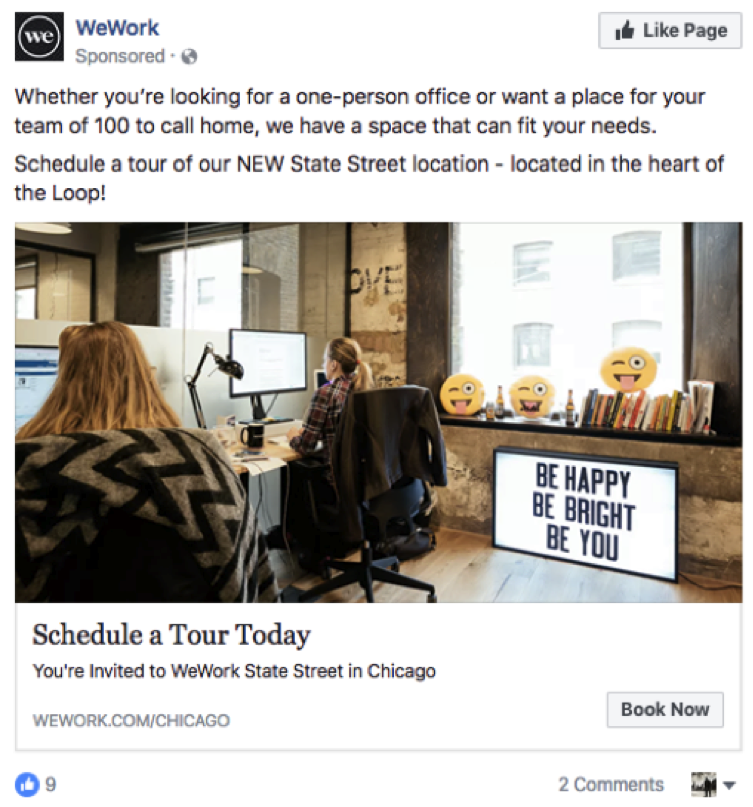Small businesses know how hard it is to build an audience on Facebook, and in the interest of honesty, we can all admit that it can be really difficult to build an organic audience on the platform. Facebook Ads are not just used to advertise products and increase sales, they are also used to increase brand recognition and increase business exposure to a relevant audience. There are a ton of great articles on how to build fantastic Facebook ads and design campaigns based on your business needs. The question really becomes, how do you measure success with a Facebook ad campaign?
The first initial reaction is, well, the amount of “likes” and followers preceding a Facebook ad campaign should make a difference, but the truth is that it is far more complex. Many businesses have turned to buying followers (it always looks a little strange when a new page has 60,000 followers and a post gets 2 likes), and as such followers are not necessarily an accurate representation of an audience that truly cares about what a page’s posts have to say.
Another common mistake is to assume that a good “reach” means a successful ad campaign. If you have reached 8k people but you only have a 1% click through rate, for example, you shouldn’t necessarily consider that to be a successful campaign. There are multiple things you need to be paying close attention to in order to measure success of a Facebook campaign.
Before You Get Started With Measuring
Before you can get started with measuring success, you need to have an understanding of “desired actions,” ultimately, the action that you want a user who comes across your ad to take. This could and will likely be different for every campaign that your run on Facebook, but it is important to understand how you are guanine success before you begin. Some actions you can prioritize include
- Website Conversion
- Page Likes
- Link Click
- Reach
- Video Play
- Share
- App Install
- Event RSVP
From here, you can monitor your preferred action, the cost per action, overall spend, frequency and revenue, initially, with the Facebook Ad Reports (a part of the Facebook Ads Manager).
Let’s Talk About Click Through Rate (CTR)
While CTR is certainly not the end all be all of success, certain clicks are important depending on your goals. Take the example below from renowned marketer Neil Patel:
In this particular example $10 was spent over the course of 7 days to increase traffic to a company blog post. As you can see it reached 278 people (not many) and had 124 post engagements (likes on either Facebook or Instagram), but, it only got 3 “link clicks” on to the actual blog, which was, at least in-part, the goal.
Of course, 124 engagements with the brand isn’t a terrible outcome for a $10 targeted Facebook ad, but if we are measuring click through rate to the blog, then this was not a successful ad campaign.
The Point: Clearly define your goals before you launch a campaign. If your goal is to increase brand awareness or page likes, then CTR is not as important as impressions or page likes. However, if your goal is to get people on to your website/a link you share, then CTR is everything!
Google Analytics URL Tagging
If your goal is to increase traffic to your site and you want to measure social ROI, then look no further than Google Analytics URL Tagging to measure success of Facebook ads. You can track clicks and interactions from those who found your Facebook ad and went to your website. The cool thing is that it builds the tags directly on Facebook and then you can look at traffic and analysis directly on Google Analytics.
The Point: If your goal is to get users from your ad to your website, then you should absolutely be using the analytics tagging feature for each campaign you run! Not only is it incredibly easy to use, but you will be able to look at the success of your social campaigns in relation to other advertisement, campaigns, traffics, and other marketing efforts that you track in analytics. This helps to give you a big picture of “success” for Facebook vs. other digital marketing.
Relevance Score and Advertising Cost
The goal with Facebook Ads (and really any other digital advertisement) is to get the most out of your advertising money. That translates to the lowest cost per goal/conversation as possible. That being said, to achieve the most bang for your buck, you want to make sure that you have a high relevance score.
A relevance score is a numerical value Facebook ascribes to your ad based on its relevance to the target audience you’ve picked. A higher relevance score means that you do not need to bid as high and that you will have a lower cost per impression. The goal is to make your ads as relevant as possible to your target audience. That being said, a low relevance score does not necessarily mean your ad will not perform well. In fact, relevance scores only take into account demographic information, not copy and creativity—so if you have those on your side you could beat-out ads with a higher relevance score.
This back-end tool on the ad manager is a really great way to see a detailed view of how Facebook prioritizes and prices your ads.
Measure Frequency
The last thing I want to talk about in terms of measuring success is frequency. Frequency refers to the number of times that users see the same ad on Facebook, and it can actually be one of the most insightful markers of success. The goal is to capture a viewer within the first time or two that they see your ad on their feed. This means that if your ad is showing multiple times to the same person then that is not a successful ad. We can all expect that we may not be able to hook someone the first time our ad shows, but if you are not grabbing them the first couple of times, you are wasting your money on a campaign that isn’t effectively targeting the right audience.
The Takeaway
You may be left at the end of this article wondering what is most important in your own Facebook adverts. That is a difficult thing to answer across the board. The key is really to establish clear goals for your campaign upfront, so you know what you are measuring upon the ads conclusion. Whether it is website conversions or video plays, you have to be the judge of what kind of outcomes you want to see so that you can have the most effective ROI possible.
Do you have experience with Facebook ads? Let us know how you measure success and tell us your story in the comment section below.




